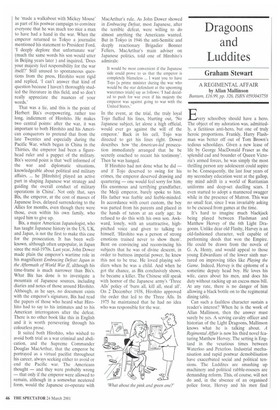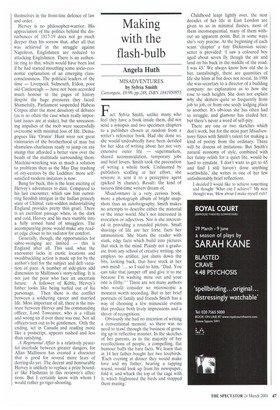Dragoons and Luddites
Graham Stewart
A REGIMENTAL AFFAIR by Allan Mallinson Bantam, £16.99, pp. 326, ISBN 0593043758 Every schoolboy should have a hero. The object of my adoration was, admittedly, a fictitious anti-hero, but one of truly heroic proportions. Frankly, Harry Flashman was better off out of Tom Brown's tedious schooldays. Given a new lease of life by George MacDonald Fraser as the splendid cad and bounder of Queen Victoria's armed forces, he was simply the most thrilling person any adolescent could aspire to be. Consequently, the last four years of my secondary education went at the gallop, my mind adrift in a world of Ruritanian uniforms and deep-set duelling scars. I even started to adopt a mannered swagger while in the presence of Matron. This was no small feat, since I was invariably asking to be excused from games at the time.
It's hard to imagine much blackjack being played between Flashman and Matthew Hervey of the 6th Light Dragoons. Unlike dear old Flashy, Harvey is an old-fashioned character, well capable of performing deeds that won the Empire. He could be drawn from the novels of G. A. Henty, and would appeal to those young Edwardians of the lower sixth nurtured on improving titles like Playing the Game. Indeed, Hervey is the epitome of a sometime deputy head boy. He loves his wife, cares about his men, and does his duty without racking up an excess mess bill. At any rate, there is no danger of him allowing a black bottle on to the regimental dining table.
Can such a faultless character sustain a reader's interest? When he is the work of Allan Mallinson, then the answer must surely be yes. A serving cavalry officer and historian of the Light Dragoons, Mallinson knows what he is talking about. A Regimental Affair is now his third novel featuring Matthew Hervey. The setting is England in the vexatious times between Waterloo and Peterloo. Industrial mechanisation and rapid postwar demobilisation have exacerbated social and political tensions. The Luddites are smashing up machinery and political rabble-rousers are demanding reform. This, of course, will not do and, in the absence of an organised police force, Hervey and his men find
themselves in the front-line defence of law and order.
Hervey is no philosopher-warrior. His appreciation of the politics behind the disturbances of 1817-19 does not go much deeper than his sorrow that, after all that was achieved in the struggle against Napoleon, Englishmen are reduced to attacking Englishmen. There is an authentic ring to this, which would have been lost if he had started mouthing some socio-economic explanation of an emerging classconsciousness. The political leaders of the time — Liverpool, Sidmouth, Eldon, poor old Castlereagh — have not been accorded much honour in the pages of history despite the huge pressures they faced. Shamefully, Parliament suspended Habeas Corpus after the most desultory of debates (as is so often the case when really important issues are at stake), but the unreasoning impulses of the mob were successfully overcome with minimal loss of life. Demagogues like 'Orator' Hunt were not great visionaries of the brotherhood of man but shameless charlatans ready to jump on any stump that afforded a better view over the heads of the multitude surrounding them. Machine-wrecking was as much a solution to problems then as the May Day trashing of city-centres by the Luddites' more selfsatisfied modem imitators is now.
Bang for buck, this is the least exciting of Heivey's adventures to date. Compared to his last encounter, which saw him outwitting fiendish intrigue in the Indian princely state of Chintal, rain-sodden industrialising England provides pretty thin gruel. There is an excellent passage when, in the dark and cold, Hervey and his men stumble into a fully armed band of smugglers. The accompanying prose would make any reader edge closer to his radiator for comfort.
Generally, though, the opportunities for sabre-swinging are limited — this is England after all. This said, what the encounter lacks in exotic locations and swashbuckling action is made up for by the author's feel for the subject and deft variation of pace. A number of side-plots add dimension to Mallinson's story-telling. It is not just the poor who face an uncertain future. A follower of Keble, Hervey's father looks like being turfed out of his parsonage. Then there is the conflict between a soldiering career and married life. Most important of all, there is the mistrust between Hervey and his commanding officer, Lord Towcaster, who is a villain and wrong un if ever there was one. Not all officers turn out to be gentlemen. Only the ending, set in Canada and reading more like a postscript, appears rushed and less than satisfying.
A Regimental Affair is a relatively peaceful interlude between greater dangers. for Allan MaHinson has created a character that is good for several more feats of derring-do yet. The decent and honourable Hervey is unlikely to replace a prize bounder like Flashman in this reviewer's affections. But I certainly know with whom I would rather go tiger-shooting.















































































 Previous page
Previous page